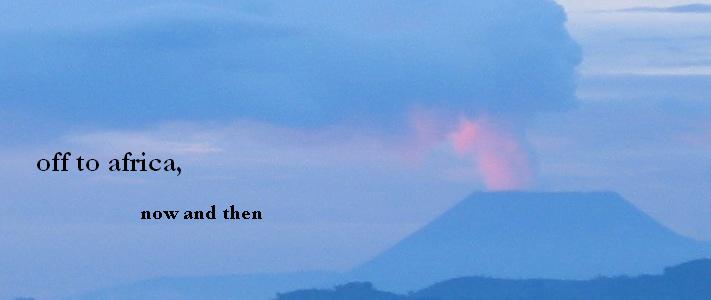Only big cities in Africa can sustain a market every day. Smaller towns hold them once or twice a week. My little town of Kibuye, in Rwanda, has (had, at least) a tiny daily market in the center of town every day, with a few vegetables and a stall for meat, but it holds its real market on Fridays. The real market is held on the sandy beach of the bay closest to town.

Boats, large wooden ones with motors and little dugout canoes with a single paddle, come over from Congo and from the islands in the middle of Lake Kivu. They carry people and animals and vegetables. The pineapple from Congo are rumored to be the best around, and a few merchants sell red palm oil from the far side of Congo, where the trees carry those little red berries.

The market is crowded with industrious boys who offer to carry your bags and wash your car. Every week, I had to choose two or three for the tasks, and the two in this photo (plus the one below with the cloth) were my favorites. After a few months of weekly bag-carrying, we knew one another well enough that I would give them each a few hundred francs and instructions to look for passion fruit or pineapple ("maracuja?"* "ananas?") and they would disappear for a few minutes, only to return with either the requested fruit or an apologetic, "maracuja, no," as they handed back my francs.
You can't quite buy everything in this market, but you can get staples like "Irish" (potatoes), sugar, and flour in the open center. You can get goats up on the hill behind the photo. You can get tomatoes, onions, and green pepper in the stalls around the edge. You can get batteries, flipflops, and padlocks in the stalls by the water. You can get bananas in piles down by the water.
You can't quite buy everything in this market, but you can get staples like "Irish" (potatoes), sugar, and flour in the open center. You can get goats up on the hill behind the photo. You can get tomatoes, onions, and green pepper in the stalls around the edge. You can get batteries, flipflops, and padlocks in the stalls by the water. You can get bananas in piles down by the water.

You can get second hand clothes along the upper road, or beautiful cloth at the stall down in the corner. You can even get it sewn up right outside, by a man with a treadle sewing machine carried laboriously from his normal shop in town.

I tried to go to the market every week. I walked sometimes, and paid the boys to carry my plastic bags home up the hill and down again, offering them a cold Fanta on my patio after they set everything in the kitchen. I took the Prado sometimes, and inched slowly down through the crowd so as not to hit the wandering children or the slow-wobbling bicycles.
I bartered, sometimes, and sometimes not. My friends who worked for volunteer organizations would be annoyed later, complaining about the price of tomatoes rising to 100 francs (20 cents) per kilo (from 80 francs - which no one ever had change for anyway, since the smallest bill is 100 and the coins are rare), but I didn't see the point of complaining about spreading a little wealth around. Anyway, my bag-carrying assistants would nod or shake their heads at the price, letting me know that yes, 100 francs was the new price or no, it was the muzungu price, keep talking.
* I just looked up maracuja in my French-English dictionary** because I'm unsure of the spelling, and apparently this is not a word that appears in Quebecois French, because it's not there. When I look it up in the English-to-French section, it appears as "fruit de la passion." Helpful.
** I also found, in my French-English dictionary, the following list:
UGANDA: gum, financial papers, card for D's car, laptop, reports from 3 partners, shillings, USD.
My life is so boring now in comparison.
I bartered, sometimes, and sometimes not. My friends who worked for volunteer organizations would be annoyed later, complaining about the price of tomatoes rising to 100 francs (20 cents) per kilo (from 80 francs - which no one ever had change for anyway, since the smallest bill is 100 and the coins are rare), but I didn't see the point of complaining about spreading a little wealth around. Anyway, my bag-carrying assistants would nod or shake their heads at the price, letting me know that yes, 100 francs was the new price or no, it was the muzungu price, keep talking.
* I just looked up maracuja in my French-English dictionary** because I'm unsure of the spelling, and apparently this is not a word that appears in Quebecois French, because it's not there. When I look it up in the English-to-French section, it appears as "fruit de la passion." Helpful.
** I also found, in my French-English dictionary, the following list:
UGANDA: gum, financial papers, card for D's car, laptop, reports from 3 partners, shillings, USD.
My life is so boring now in comparison.

No comments:
Post a Comment